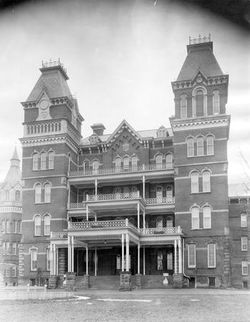Athens State Hospital
| Athens State Hospital | |
|---|---|
 | |
| Established | 1867 |
| Construction Began | 1868 |
| Opened | 1874 |
| Closed | 1993 |
| Current Status | Preserved |
| Building Style | Kirkbride Plan |
| Architect(s) | Levi T. Scofield |
| Location | Athens, Ohio |
| Peak Patient Population | 1,749 in 1953 |
| Alternate Names |
|
Contents
History
In 1867 the Ohio Legislature appointed a commission to find a site for an asylum in south-eastern Ohio. A site in Athens was found suitable. Construction began in 1867 and the Athens Lunatic Asylum was completed during 1874. Levi T. Scofield was the architect. The Athens Mental Health Center opened on January 9, 1874 on land purchased from the Coate's farm. The asylum itself was built from bricks which were fired on-site from clay dug on-site. Herman Haerlin, a student of Frederick Law Olmstead (the designer of Central Park), was responsible for the design of the hospital and its grounds. By the turn of the twentieth century, orchards and farmland were maintained on the property, tended to by hospital residents and employees. This made the hospital nearly self-sufficient. Nevertheless, at the time of its construction it was a major boon to the economy of the city of Athens, which was able to supply milk, eggs, linens, and other necessities. Local citizens made use of Haerlin's extensive grounds, which included landscaped hills and trees, a pond, a spring, and a creek with a falls.
The Administration building housed offices of the Superintendent, assistant physicians, steward, and a general reception room for visitors. Two wings added to the building were used for patients. The second floor contained apartments of the medical superintendent. The third and fourth floors were used for administrative offices.
Over the years the buildings and grounds at the Athens Mental Health Center underwent many changes. In the 1920s a fire destroyed the grand ballroom. In 1924 a building was erected on the grounds for the treatment of mentally ill patients with tuberculosis. In 1928 the dairy barn went in, making the hospital almost self-sufficient. Later, in 1960, part of the farmland belonging to the hospital was acquired by Ohio University for the construction of the Convocation Center. Between 1968 and 1972 the Hocking River and State Route 682 were rerouted, eliminating the reservoir as well as four of the decorative lakes on the property.
In 1977 multiple personality rapist Billy Milligan was sent by a Franklin County judge to Athens for treatment after his insanity plea was accepted by prosecutors--a first in American history. Milligan had kidnapped and raped three women on campus at Ohio State but had been suffering from mutliple personality disorder from early childhood. His story was told in the book The Minds of Billy Milligan by Daniel Keyes (the author of Flowers for Algernon). Billy Milligan's stay at the Ridges was among the last ever. In 1972 the last patients were buried in the asylum cemetery; by 1981 the hospital housed fewer than 300 patients. 344 acres of land were transferred to Ohio University. The final patients left the Athens Center in 1993, when they were bused to a new, much smaller hospital across town. The building stood vacant for several years while Ohio University prepared to renovate it into museum, office, and classroom space.
In 2001 renovation work was completed on the main building, which today is known as Lin Hall and houses music, geology, and biotechnology offices, as well as the Kennedy Museum of Art. Nearly all of the dozens of hospital buildings have been remodeled and put to use by the University.[1] Although the main administration building and some sections of the patient wings have been renovated, much of the Kirkbride is still empty and awaiting reuse.
Like many other Kirkbrides, the building sits on top of a hill. It faces the nearby Hocking River looking toward the center of Athens and the main campus of Ohio University. The building appears to be in exceptionally good condition, although the cupolas which used to crown parts of the roof are now missing. The ward interiors don't have much in terms of remaining nineteenth-century architectural details either.[2]
Images of Athens State Hospital
Main Image Gallery: Athens State Hospital
Cemetery
Three cemeteries are on the grounds of the hospital, maintained by the Ohio Dept. of Mental Health. About 2,000 former patients are buried in the 3 cemeteries, most are marked with only a number.
Books
"Asylum on the Hill: History of a Healing Landscape", Katherine Ziff
Video
- Video from Kirkbrides HD ~ http://www.vimeo.com/channels/KirkbridesHD
<videoflash>DfByk0Eh5EU</videoflash>



